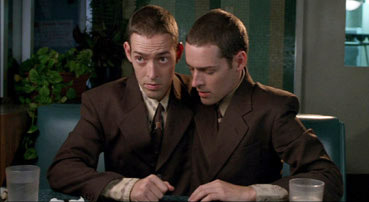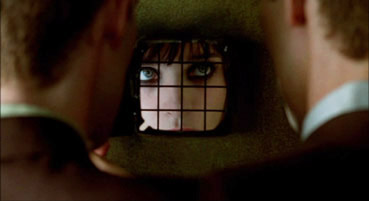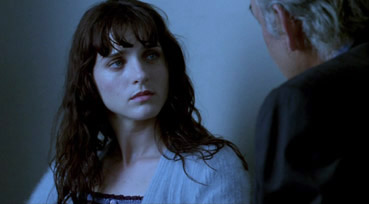|
Conjoined
twins are about as rare in movies as they are in real life, and when they do appear they're usually background
characters in fairgrounds and played for comic effect. In
Hitchcock's The Ring the twin
seach want to sit in opposite sides of the church at a wedding,
and in Tod Browning's Freaks they cheerfully
plan separate futures and encourage each other to come visit them once they are married. How many films can you think of in which conjoined
twins are the central characters in a story in which their situation taken
seriously? I can think of only one, and you're reading about
it right now.
It
can't have been an easy pitch, a low-key character drama
about conjoined twins and the friendship they develop with
a young prostitute, written by two real-life twins who are also
planning to play the dual lead roles and whose only previous
movie credits were supporting parts in Hellraiser: Bloodline.
Oh, and one of them wants to direct it, too. Despite the
potential gimmick factor of a film made by, starring, and
about twin brothers, I would like to think those who were
bold enough to invest the $500,000 it took to get it to the
screen did so because they saw real potential in the material
and had faith in the filmmakers. I'd also hope that, despite obvious fact that the film was never destined
to be a big money spinner, they'd believe that the finished
film justified their faith.

When
I received the preview DVD, it had been some time since I'd last
seen the film, my first exposure to it being at a cinema
screening I was involved in organising. Like many who came
to the film then, I was drawn by the very thing that presumably
kept the mainstream audience at a distance – the unusual
nature of the subject matter and its reputation for being
strangely compelling. A few years later I remember being utterly captivated
by the film, but could not recall exactly what it was that
made it so damned intriguing. Watching it again it took
just a couple of minutes for total recall to kick in. There's
no loud hook here, no Matrix-like bang
to make sure even those with short attention spans stick
with the film during the expositional sequences that follow.
It's all little things, suggestive moments that have a semi-abstract
quality the first time round but which actually make sense on
a second viewing – the opening shot that shifts from negative
to positive, the taxi driver with a hook for a hand, the
glum-looking elevator man of 52 years standing who asks
young call-girl Penny if she is here to see Jesus, and his suggestion
that if the door she is standing in front of looks like
all the others, then it's not the one she wants.
The
hotel in which the elevator man works, at which Penny has
just arrived, has an atmosphere of instant intrigue,
a little dash of David Lynch, a dab of Barton Fink,
and music that, in the manner of Blade Runner's
quieter moments, seems ooze quietly from the paintwork rather
than underscore the action. Penny finds the right room and
her allotted client, one Francis Falls, but when he emerges
from the bathroom he is not one but two, Francis and Blake,
joined mid body with three (and a half) legs between them
and an arm apiece, well dressed, hesitant, gentle of voice
and calm in expression. There is nothing sensational about
their introduction or presentation, but the startled Penny flees nonetheless.
In the scenes that follow, it is suggested that there is
far more to her present state of anguish than the shock
of her first look at the Falls twins.
It's
the following scene where the tone of the film is really
set, and where you'll either go with the film or tune out.
The twins seem largely unperturbed by Penny's departure,
and settle down to quietly mark their birthday with a cake
of differing halves for different tastes, despite the fact that they share a stomach. They are interrupted when Penny returns to the
hotel room, not out of remorse for her actions, but because
she forgot her purse. Her initial shock now overcome, she
asks to borrow their phone, and while she makes her call
the twins return their full attention to the cake, only
occasionally looking up at her in uncannily perfect unison.
Following the call, Penny sits with her head in her hands,
which the twins respond to by silently offering her a slice of birthday cake, which she gratefully accepts.
As she quietly waits for the return call, the brothers drift off to sleep on the room's pushed-together single beds.

Nothing
about the above may sound particularly exciting, but
the way it plays on film is just... man, I'm still stuck
for words to describe just why it feels so perfect.
The brothers themselves are a major factor here, beautifully
underplayed by Mark and Michael Polish, who are locked to
each other by an invisible rig so effectively that it's
hard to imagine where their hidden body parts are. Their
soft-spoken, wide-eyed uncertainty, their secretive whispering
to each other and their coordinated behaviour makes them
instantly fascinating and sympathetic characters. In just
this one scene we are able to see past their condition and connect
with the people affected by it.
The
friendship that develops between the Falls brothers and
Penny is the core of the film. While we are to some extent
in familiar territory – movie sex workers always seem to have
a heart of gold – the relationship is handled with such
sensitivity, and Michele Hicks is so assured as Penny, that
this never seems to matter. Slowly we learn a little about
the twins, that have come to town find the mother who long
ago abandoned them, that Francis is not as physically strong
or healthy as Blake and relies heavily upon him, and that
Blake loves his brother but still secretly longs for the
freedom of separation, feelings that come to a head when he
begins falling for Penny.
Penny's
next encounter with Francis and Blake finds them at their most relaxed.
It's Halloween, the one night of the year they are able to
interact with so-called regular society without attracting
undue attention, as they go trick-or-treating in the most
convincing Siamese twin get-up Penny's waitress friend has
ever seen. They even follow Penny to a party, where the
film comes close to over-literalising their feelings when
two guests in Siamese twin fancy dress untie their bonds
and separate while the brothers mournfully watch on.
Twice more the sublime subtlety exhibited elsewhere is allowed
to slip, first in the shape of Penny's lawyer friend Jay
(dubbed by the filmmakers "The Exploiter"), who
excitedly suggests a whole slew of ways that the brothers
can capitalise on their condition and in the process comes to (a little crudely) represent the media and society at large. This is brought home a short while later when the fleeing pair stop to catch breath
in a park, and are stared at and photographed through a fence
like caged exhibits. But even these overstated moments are well handled and have later resonance – once again, a
second viewing adds to their meaning and purpose.
For the most part, suggestion is the order of the day. A duet in which the
brothers jointly play a guitar and sing to Penny, for instance,
at first seems like something they have learned to do to
pass the time – only later, when the dots are connected to their
past, is the significance of this sequence fully appreciated.
It's the small details that prove the most affecting and
memorable, appropriate given that the two brothers communicate
through looks and whispers rather than grand gestures. Their
spoken delivery is always calm and measured, and when there
is a later break from this and strong emotions are expressed,
the effect is appropriately jolting.

The
quiet approach also works for key supporting characters,
notably Penny's doctor friend Miles, who crosses himself
on first encountering the brothers without for a second
breaking his cheery smile, and whose very gentle delivery
nonetheless carries considerable dramatic weight. The tone
of the film is always in tune with these performances, something
that is occasionally disrupted by characters who are not
working on this wavelength (the pushy lawyer, the camp party
host, the drunken guest), so that we see them as Blake and
Francis do, as outsiders to their world, threatening its
delicate stability. The happy exception is their next door
neighbour, a cheery preacher named Jesus (his "HEY
ZEUS" number plate is one of my favourite humorous
touches), who lives up to his namesake by being the only
one who instantly accepts the two for who they
are – when he insists on transporting Francis to the hospital
and Blake reveals to him for the first time that they are conjoined twins, he says with barely
a pause, "Then I guess you're going too!"
Despite
watching it again three times on Metrodome's new UK DVD,
I still have trouble pinpointing exactly what it is that
makes Twin Falls Idaho so special. In the
end its really down to a finely balanced combination of
all the things that can be so wonderful about a small independent
feature, where action is secondary to character, atmosphere
takes precedence over pace, and originality is always prized
over formula. And like so many fine independent films, this
is about people rather than events, as genuinely touching
a story of brotherly love as you'll ever see. As he drives
the pair to hospital, neighbour Jesus describes them as
"the biological representation of togetherness."
Amen to that.
The
UK DVD of Twin Falls Idaho has been along
time coming, given that Sony's region 1 disc, whose anamorphic
transfer was pretty damned good, was released six years
ago. The transfer on this Metrodome region 2 disc appears
to have been sourced from the same original, indicated by
the occasional dust spots appearing in the same places,
but in other respects the Metrodome disc has the edge over
the Sony one, with fewer compression artefacts and better levels
of detail. Colour reproduction is very pleasing, nicely
capturing the painterly compositions (the directors acknowledge
the influence of both Vermeer and Edward Hopper). The running
time suggests an NTSC to PAL transfer, but if that's the
case then it's good one, with no obvious ghosting or contrast
issues. The aspect ratio is 1.85:1 and the picture is anamorphically
enhanced.
The
Sony disc had both stereo 2.0 and surround 5.1 tracks –
only the 5.1 track is on offer here, but that's fine, as
differences between the two were minimal anyway. The rear
speakers don't have much to say, but clarity is good and
there's some serious bass in the Halloween party sequence.
Optional English SDH subtitles have been included.
The
only extra here was also the principal one on the Sony disc,
a commentary by Mark and Michael
Polish. As soft spoken here as they are on screen, there
are moments when I momentarily mistook a comment on the
action for off-screen dialogue. But it's all interesting
stuff, covering the filming, the casting, the influences,
working with actors, the tight shooting schedule (just 17
days) and a host of other aspects of the film. Particularly
interesting is the information about their own performances,
the rig that held them together, and the reaction of the
other actors on seeing them in it for the first time (which
is caught on camera – the actors got their first looks as
their characters did).
The
Sony disc also had brief biographies for Mark and Michael
Polish and Michele Hicks, but their absence here is not
an issue as the information is freely available online.
It's
been a bit of a wait, but it's finally here on region 2
DVD. Many will have not seen or even heard of it (a
few years has passed since its cinema release), but here's
the opportunity to put that right. It's an unusual and remarkable
debut, and one that has found its way onto one or two favourite
films of the year lists, mine included. For the quality of the transfer,
a worthwhile commentary, and a rather special little film,
this disc is highly recommended.
|